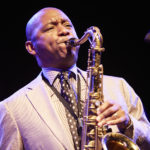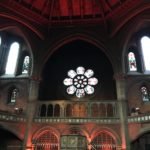You know you’re in for a great and auspicious evening’s entertainment when the venue is sublimely matched to the artist. A band may begin playing the pubs and may in the course of the rise to stardom end up playing vast stadia with the audience a mile off, but somewhere in-between there is a venue that meets their music to perfection.
So it was on this May evening as the fine saxophonist Branford Marsalis played a solo recital of his music for Cathedrals at the Union Chapel, a working church whose high-ceilinged acoustics allow the clear tones of a sax to soar and resonate with a sweetness you could barely imagine, perhaps suiting best the purity of the soprano sax.
Marsalis, older brother of trumpeter and band leader Wynton Marsalis and three other jazz-playing siblings, is known primarily for work with his quartet, but a solo gig allows the full breadth of his repertoire and the glorious clarity of tone time and space to flourish.
His set (two 45-minute stints) picks up on all his musical influences to showcase Marsalis’s virtuosity; it transcends style and genre at every turn, from baroque to blues to bebop, a soulful lick here, a startling improv there, an American standard or two thrown in, even a foot-tapping rendition of the gospel classic When The Saints Come Marching In on soprano for an encore.
Second number in, Marsalis picked up the tenor and launched into an achingly beautiful rendition of Hoagy Carmichael‘s ballad Stardust, his phrasing a delight. At no point did he appear rushed, just a relaxed player totally at ease with his music, strolling in front of the pulpit with all the time in the world to construct a perfect melody.
A more moving rendition it would be impossible to conceive, but the mood moved swiftly on. Most but not all pieces shared a melodic lyricism Marsalis achieves with effortless technique. The fact that a saxophonist can turn to variations on Bach with such refreshing poise demonstrated to me that good music is good music, whatever labels are applied.
I can’t tell you the titles of all the pieces played, since Marsalis did not announce them – indeed, he allowed his horns to do the talking apart from a quip before the interval, but each tonal shift furthered this grip on an enthralled audience, none more so than a spine-tingling avant garde improvisation reminiscent of native American rhythms but played on alto sax, which came directly after the interval.
Nary a duff note and evidence if you needed it that music truly elevates the soul. See Branford Marsalis while you get the chance!
***** (5 stars)









